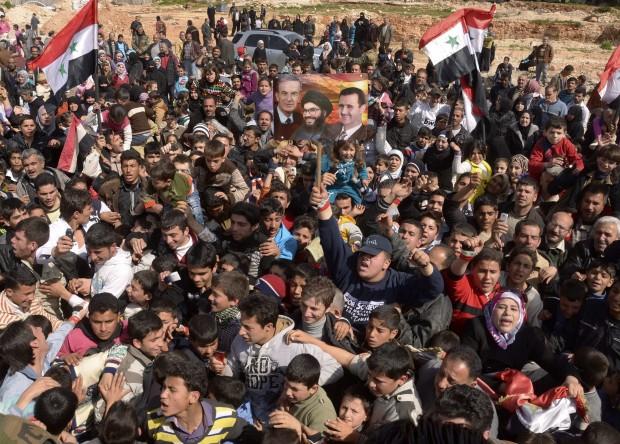Hezbollah Comes Clean: It Stands With Syrian Government
People chant slogans while holding Syrian national flags and a placard (C) with images of former Syrian President Hafez al-Assad (L), Syria’s President Bashar al-Assad (R) and Lebanon’s Hezbollah leader Sayyed Hassan Nasrallah during a protest in support of Bashar al-Assad in Aleppo March 9, 2013. REUTERS/George Ourfalian (SYRIA – Tags: CIVIL UNREST MILITARY POLITICS CONFLICT) – RTR3ERVA
As President Obama considers US options in war-torn Syria, one of Bashar al-Assad’s longtime clients just offered a public pledge of support.
Hasan Nasrallah, leader of the Lebanese militant group Hezbollah, delivered a speech in Beirut this week declaring that “Syria has friends that will not allow it to fall.”
Nasrallah’s words were the closest thing yet to a public admission that Hezbollah is directly involved in Syria’s civil war, though it’s been an open secret that his militiamen have been fighting and dying alongside Syrian government forces.
“Almost every day there are new reports… of Hezbollah fighters coming home from Syria in body bags,” said Matthew Levitt of the Washington Institute for Near East Policy. “They’re described to have been engaged in, as Hezbollah puts it, ‘their Jihadi duty.'”
Levitt is the author of the forthcoming book, “Hezbollah: The Global Footprint of Lebanon’s Party of God.”
But why did Nasrallah make a such a public declaration of support for Syria’s government now?
“The pressure is mounting on Nasrallah,” Levitt said. The Shi’ite leader wanted to address his domestic Lebanese audience first and foremost, “to try and explain that [Hezbollah’s military involvement in Syria] is …a defensive campaign to protect fellow Shia, fellow Lebanese, Shia shrines [inside Syria].”
Secondly, Nasrallah wants to maintain Hezbollah’s credibility as a Lebanese resistance movement, dedicated to the struggle against Israel, the US and al-Qaeda.
But Levitt said that there is a risk here too for Hezbollah, because much of Lebanon, especially its Sunni Muslim population, has come to see Syrian President Bashar al-Assad as a tyrant and butcher.
“You have a situation now where some of the radical Sunnis in Syria and Lebanon aren’t only calling for fighters to go and fight the regime in Syria, they’re calling for fighting Hezbollah.”
Levitt points to recent reports of a bomb planted in the Hezbollah stronghold of southern Beirut, allegedly by the al-Qaeda-linked group, the Nusra Front. The group is considered to be the most capable anti-government militia operating right now in Syria. And that makes both Washington and its allies in Israel wary.
When Israelis listened to Hasan Nasrallah’s speech this week, what they heard was the voice of Tehran.
“Iran cannot lose its strategic hold in Syria and therefore it’s now letting loose all of its cannons in trying to deter anybody from intervening in Syria,” said Shmuel Bar, a former Israeli military intelligence official now with the Institute of Policy and Studies in Herzliya, Israel.
Bar said Hezbollah’s warning to Washington went like this: Either stay out of Syria, or face terrorist attacks against US assets in the region and American allies.
It is not clear if Hezbollah has the capacity to back up those kind of threats, said Thanassis Cambanis, author of “A Privilege to Die: Inside Hezbollah’s Legions and Their Endless War Against Israel.”
However, “because of Hezbollah’s involvement,” Cambanis went on to say, “the war really is pushing across the border into Lebanon.”
“Even [for the] people who support Hezbollah, this carries a real grave danger of a war between Shia and Sunni inside Lebanon.”
For Nasrallah and his Lebanese Shi’ite militia, this is “an existential struggle to protect their strategic hinterland in Syria,” Cambanis said.
Experts have long warned that fighting in Syria could ignite a regional war. And it looks like Lebanon just took another step closer to being sucked into the sectarian bloodbath next door.
The story you just read is accessible and free to all because thousands of listeners and readers contribute to our nonprofit newsroom. We go deep to bring you the human-centered international reporting that you know you can trust. To do this work and to do it well, we rely on the support of our listeners. If you appreciated our coverage this year, if there was a story that made you pause or a song that moved you, would you consider making a gift to sustain our work through 2024 and beyond?
